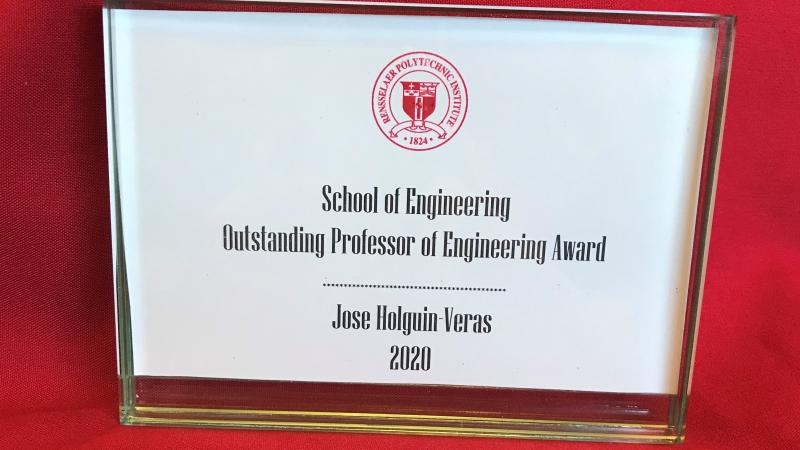February 10, 2021

More than a dozen faculty members in the School of Engineering at Rensselaer Polytechnic Institute have received 2020 School of Engineering Faculty Awards.
The awards recognize innovative pedagogy, high impact research, and teamwork by Rensselaer Engineering faculty who have continued to push the frontiers despite the challenges of the COVID-19 pandemic.
“Through their work, these faculty members elevate and transform our research, innovate in pedagogy, and enhance the student experience,” said Shekhar Garde, the dean of the School of Engineering at Rensselaer. “I am particularly impressed by how they have overcome the challenges presented by the COVID-19 pandemic through their intellect, dedication, creativity, and collaboration.”
José Holguín-Veras, the William H. Hart Chair Professor of Civil and Environmental Engineering and director of the Center for Infrastructure, Transportation, and the Environment, has received the Outstanding Professor of Engineering Award, which recognizes an individual who is an outstanding teacher and mentor, exceptional researcher, and major contributor to the school and broader community. Holguin-Veras’ research in the broad area of transportation, ranging from freight demand modeling, to sustainable freight policy, and disaster response logistics, has transformed the field. His impact on mentoring students, especially underrepresented students, is noteworthy.
Emily Liu, a professor of mechanical, aerospace, and nuclear engineering, and Omar El-Shafee, a lecturer in civil and environmental engineering, have received the Education Innovation Awards. Liu received this award for her innovation in developing new and engaging approaches to instruction and her dedication to committing much of her time to mentoring students. El-Shafee received this honor for his passion and engagement within the classroom, as he promoted new teaching practices to help students master complex topics.
Shankar Narayanan, an associate professor, and Keith Taylor, a lecturer, both in the Department of Mechanical, Aerospace, and Nuclear Engineering, received the Classroom Excellence Award. Among their accomplishments, Narayanan integrated modern computing techniques and mobile augmented learning in his classes, while Taylor revitalized a number of key engineering courses by modernizing content and applications.
Five faculty members received Research Excellence Awards including:
- Mattheos Koffas, the Dorothy and Fred Chau ʼ71 Constellation Professor of Chemical and Biological Engineering, who received the award for his contributions in the development of metabolic engineering methods to produce animal free natural products.
- Jie Lian, a professor of mechanical, aerospace, and nuclear engineering, who was recognized for his contributions to the fundamental understanding of materials behavior under extreme environments, accomplishments in graphene research and applications, and his development of innovative materials and technologies.
- Kristen Mills, an assistant professor of mechanical, aerospace, and nuclear engineering, who received this honor for her contributions in experimental cell and tissue biomechanics, leading to greater understanding of the role of mechanics in disease, especially cancer.
- Ravishankar Sundararaman, an assistant professor of materials science and engineering, who received this award for his contributions to quantum simulations of charge transport and interfacial phenomena in complex materials.
- Pingkun Yan, an assistant professor of biomedical engineering, who was recognized for his contributions during the pandemic by developing a method for analyzing chest CT images to predict a patients’ likelihood of needing ICU intervention.
Suvranu De, the J. Erik Jonsson ’22 Distinguished Professor and head of the Department of Mechanical, Aerospace, and Nuclear Engineering; Alhussein Abouzeid, a professor of electrical, computer, and systems engineering; and Uwe Kruger, a professor of practice in biomedical engineering, received the Outstanding Team Award for their work on developing a Virtual Operating Room Team Experience (VORTeX). This project aims to develop virtual reality environments where doctors and nurses can practice life-saving and team-building skills in a risk-free setting. The team recently received a supplemental National Institutes of Health grant to create virtual environments for clinicians training to treat COVID patients.